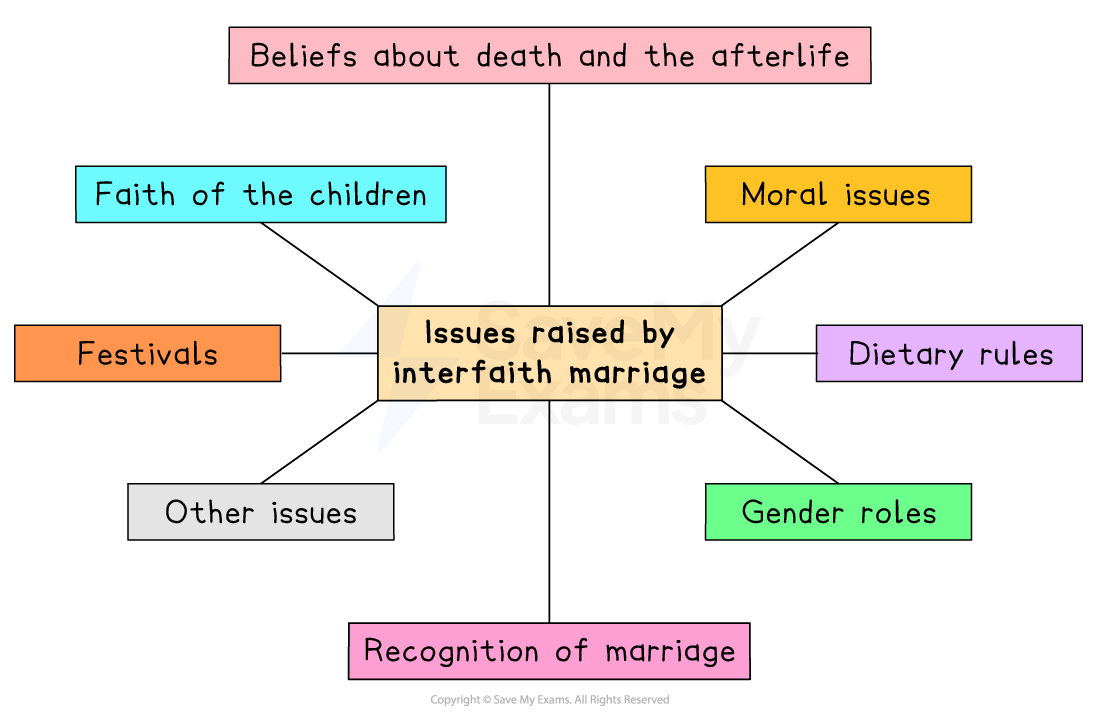Marriage (WJEC Eduqas GCSE Religious Studies): Revision Note
Exam code: C120
What is marriage?
Marriage is a legal and sometimes religious union between two people as partners in a relationship
It is a lifelong public commitment
The legal contract brings security as it protects the rights of each partner
Marriage is generally between a man and woman, but in the UK and some other countries, it can be between two people of the same sex
Marriage outside religious traditions
For people who have always been members of a religious faith, their religion may be central to their life and values. This means that they want to:
Continue to practise their religious faith after their marriage
Bring up their children in the same faith as them
Raise their children with the values taught by their faith
Therefore, it is natural for a person to look for a partner who shares their beliefs and values
Many parents believe they have a duty to ensure that their child marries someone who is compatible, and religious faith can be a key factor in this process
However, in a pluralistic society, there are an increasing number of interfaith marriages
When a religious believer chooses a partner who is from a different faith, or of no religious faith, it can cause issues such as:
Which religion children should be raised in
Which religious festivals the family should celebrate
What children should be taught about death and the afterlife
Which dietary rules and traditions the family should follow
Differing views about moral issues, such as the use of contraception
Differing views about the roles and responsibilities of men and women
Other family members or community members refusing to accept the marriage

These issues can begin before the marriage even takes place, as there may be differing views about where to get married
If there is an issue regarding people of different religious beliefs marrying in a place of worship, they could have a civil (legal) ceremony, followed by a religious blessing
Christianity and marriage outside religious traditions
St Paul taught:
“For the unbelieving husband is made holy because of his wife, and the unbelieving wife is made holy because of her husband. Otherwise your children would be unclean, but as it is, they are holy.” (1 Corinthians 7:14)
“If any woman has a husband who is an unbeliever, and he consents to live with her, she should not divorce him.” (1 Corinthians 7:13)
In both of these teachings of St Paul to the early Christians of Corinth, he is telling people that marriage between Christians and non-Christians is acceptable
This is still true today: Christians are permitted to marry non-Christians, but Catholic and evangelical Christians are urged to think carefully about the pressure that different religious views may put on their marriage and the tensions that it may cause
There are certain considerations for Catholic and Orthodox Christians
If a Catholic marries outside the Catholic faith, then the non-Catholic partner must promise to raise any children in the Catholic faith
In the Orthodox Christian tradition, a marriage can only take place if an Orthodox Christian is marrying a baptised Christian
Islam and marriage outside religious traditions
In Islam, marriage is very important as the foundation of family life: It is seen as a social contract that brings two families together
Therefore, Muslims have very traditional views on suitable marriage partners
Muslims traditionally have arranged marriages, as “dating” is not encouraged in Islam
Islamic law forbids marriage between a Muslim woman and a non-Muslim man
This is chiefly because children are traditionally raised in the religion of their parents, and if the parents are of differing religions, the children are less likely to be Muslim
Therefore, there may be concerns if a Muslim chooses to marry someone who is not Muslim
Muslim men are permitted to marry Christian or Jewish women, as these religions share some common beliefs and holy texts
These marriages could take place in a special place rather than a holy building
Most Muslims still prefer to marry partners from the same religion
Worked Example
What is meant by “interfaith marriage”?
[2 marks]
Answer:
An interfaith marriage is when two people from different religious backgrounds marry. For example, a Muslim man may marry a Christian woman.
Examiner Tips and Tricks
When you see the phrase “marriage outside the religious tradition”, remember that it can mean:
Marriage between different traditions within the same religion (e.g. a Catholic marrying an Orthodox Christian)
Marriage between people of different religions (e.g. a Muslim and a Christian)
Marriage between a religious believer and a non-believer/atheist
In an exam answer, be clear which type you are writing about and use examples or quotes to back it up. This shows the examiner that you understand the full range of possible meanings.

Unlock more, it's free!
Was this revision note helpful?
